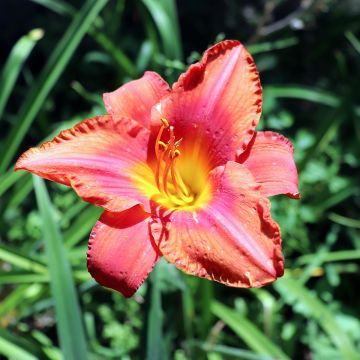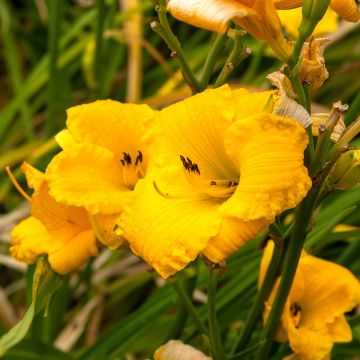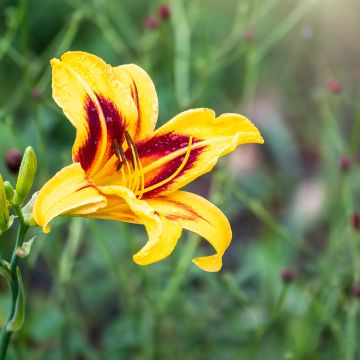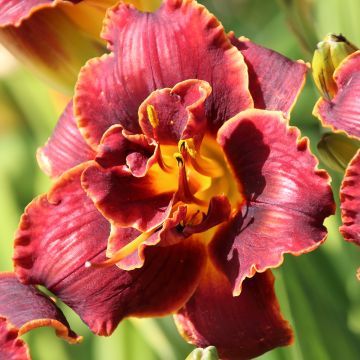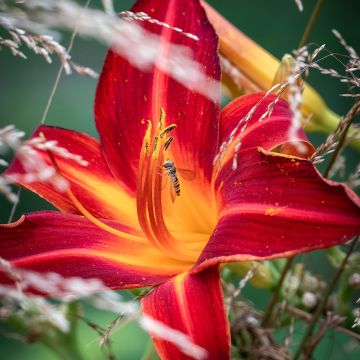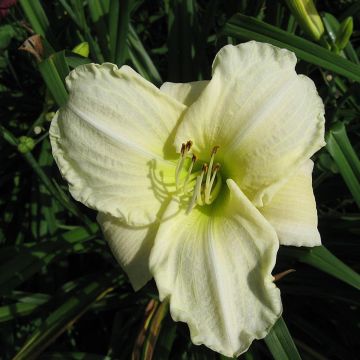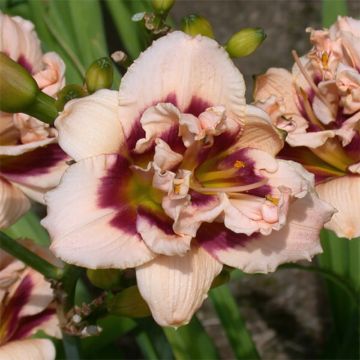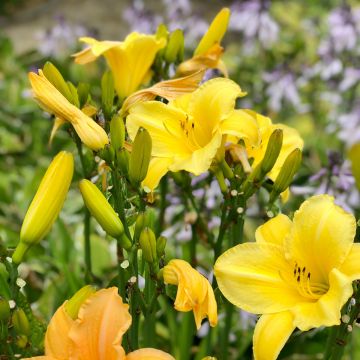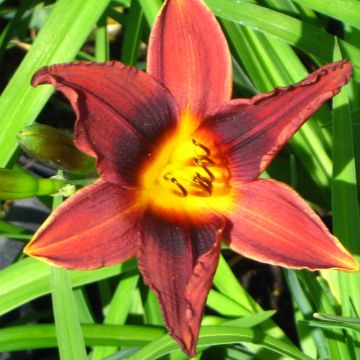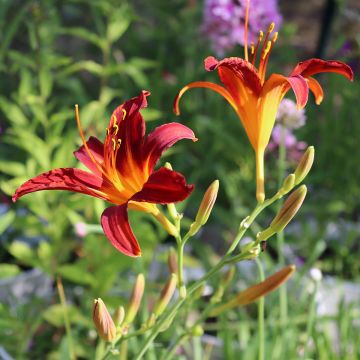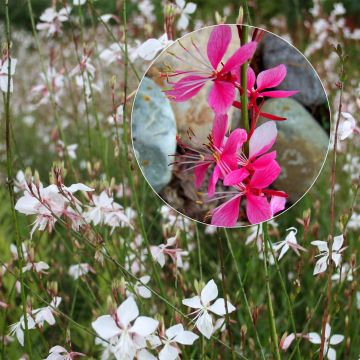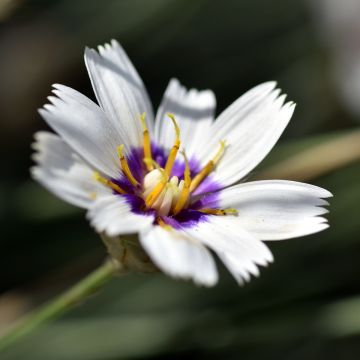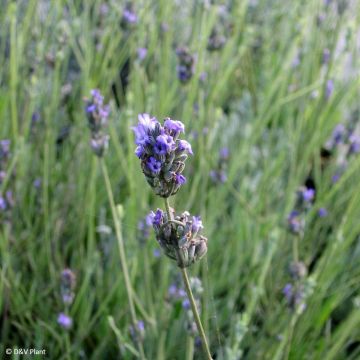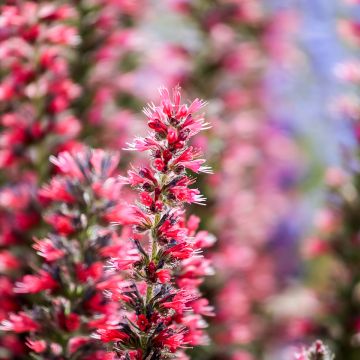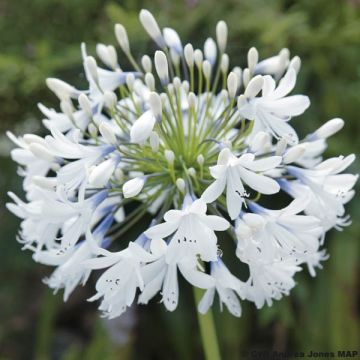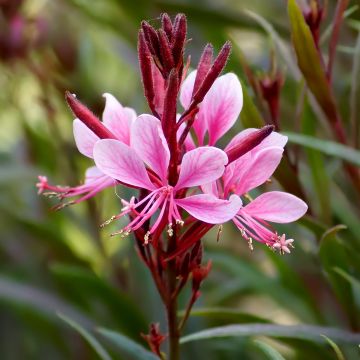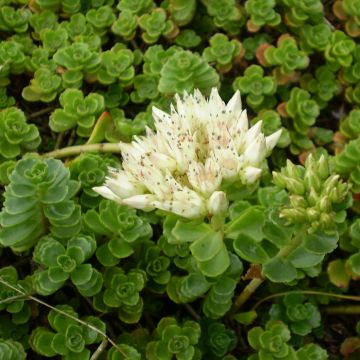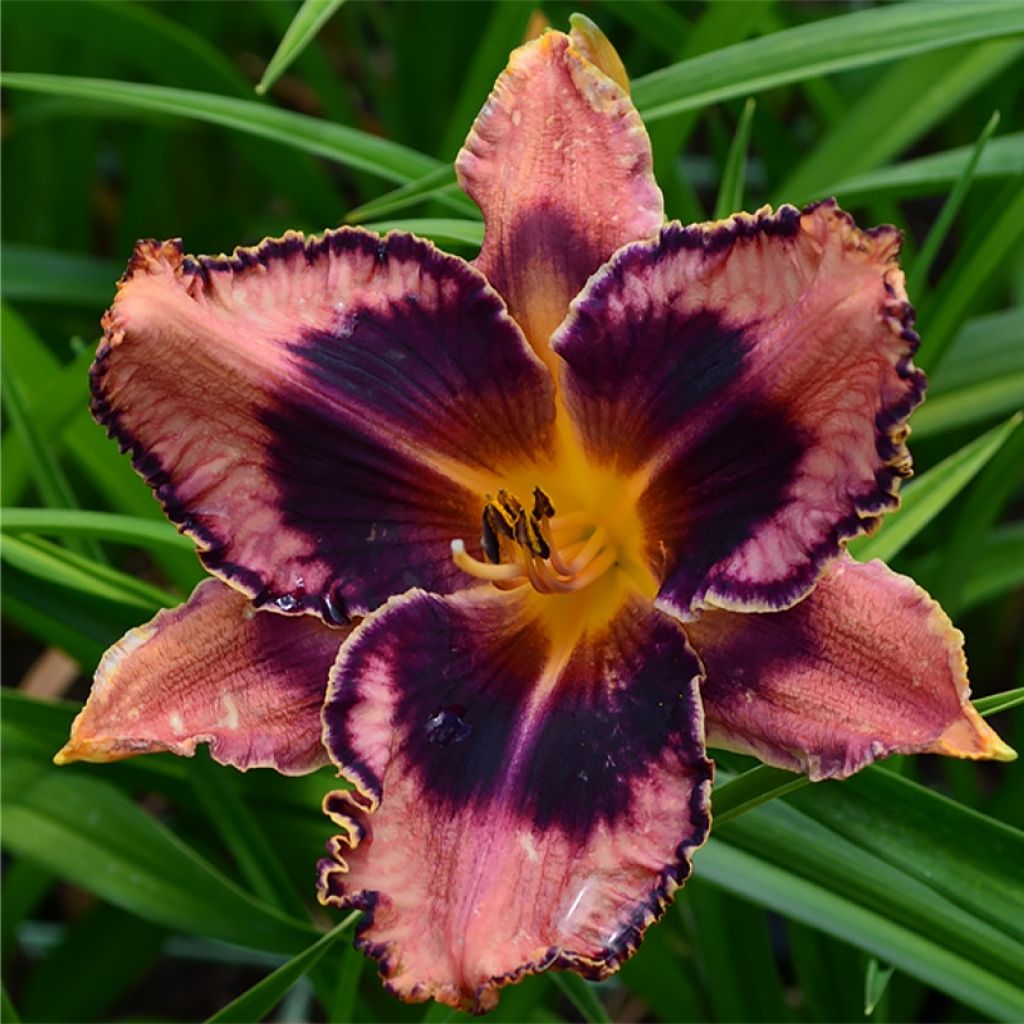

Hemerocallis Exotic Treasure - Daylily
View more pictures
Hide images

Marie D.

Daylily exotic treasure June 2022
Marie D. • 75 FR
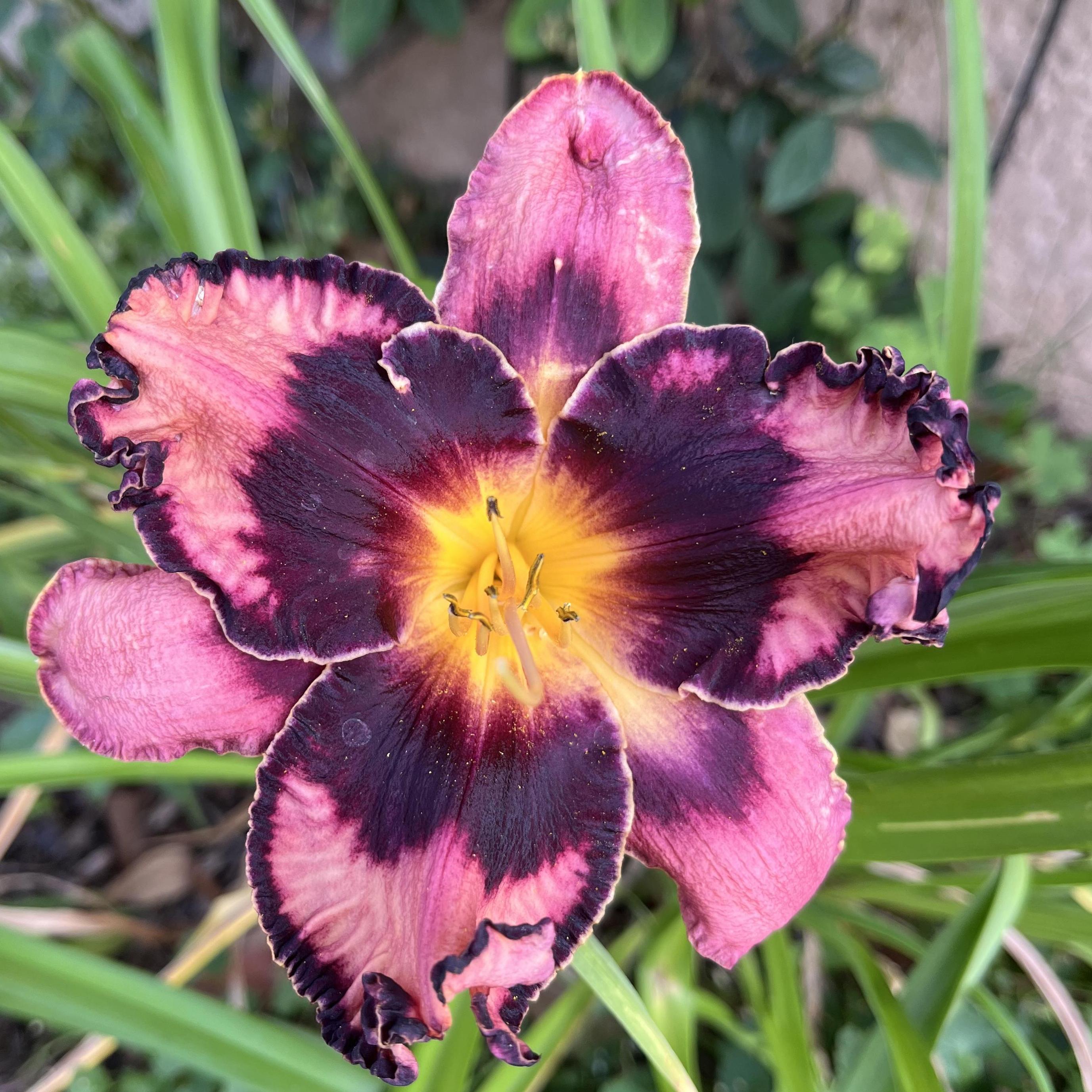
Sophie M.

Sophie M. • 11 FR
Hemerocallis Exotic Treasure - Daylily
Hemerocallis Exotic Treasure
Daylily
Gorgeous daylily! It perfectly enhances my garden and is very prolific in flowers.
Soph222, 18/06/2025
Special offer!
Receive a €20 voucher for any order over €90 (excluding delivery costs, credit notes, and plastic-free options)!
1- Add your favorite plants to your cart.
2- Once you have reached €90, confirm your order (you can even choose the delivery date!).
3- As soon as your order is shipped, you will receive an email containing your voucher code, valid for 3 months (90 days).
Your voucher is unique and can only be used once, for any order with a minimum value of €20, excluding delivery costs.
Can be combined with other current offers, non-divisible and non-refundable.
Home or relay delivery (depending on size and destination)
Schedule delivery date,
and select date in basket
This plant carries a 12 months recovery warranty
More information
We guarantee the quality of our plants for a full growing cycle, and will replace at our expense any plant that fails to recover under normal climatic and planting conditions.

Would this plant suit my garden?
Set up your Plantfit profile →
Description
The Daylily or Hemerocallis 'Exotic Treasure' is a perpetual variety that bears numerous round flowers with wide petals, finely frizzed at the edges, superbly bicoloured in soft melon pink and dark purple. With its relatively early, abundant and prolonged flowering, this superb tetraploid cultivar has an exotic charm. The plant quickly forms beautiful clumps of evergreen leaves in winter.
The genus Hemerocallis belongs to the family Liliaceae or Hemerocallidaceae according to classifications. They are perennial and hardy plants with deciduous foliage, sometimes semi-evergreen. 'Exotic Treasure', obtained in 2002 by Salter, has given rise to 38 more recent cultivars. It is a so-called tetraploid variety with a double stock of chromosomes, giving it increased vigour and oversized flowers compared to classic diploid varieties. It forms a fairly dense clump that will reach about 70 cm (28in) in height, with a relative spread of 50 cm (20in); daylilies tend to spread a little when they like the soil. The flowers measure about 13 cm (5in) in diameter. They comprise three large, thick, slightly wavy, rounded petals with undulating edges and three marginally smaller sepals.
The petals are a pale melon pink with an orange tint; they have a large halo of a very contrasting dark purple colour and a border of the same tone. The sepals are slightly more pink, well undulated, but without any trace of violet on the edges. The throat is yellow and green. Each flower opens in the morning and lasts no more than a day, but the flowering extends from June to the end of September. Each floral stem has four branches and carries between 36 and 40 flower buds. It is not uncommon for four flowers to bloom at the same time. The foliage is linear, bright green and evergreen in winter. Daylilies are plants with short rhizomes and fleshy roots that tolerate dry soils but are more opulent and floriferous in moist soil.
Very easy to grow, these plants thrive in shade and full sun. Some can be invasive, so divide clumps every four or five years, preferably in autumn, after flowering. Daylilies are often called "the perfect perennial" because of their vibrant colours and ability to tolerate any environment, but also because of their lack of modesty; they have a beautiful exuberance that goes well with other perennials. Plant them in generous clumps at the back of your flowerbeds. All summer bulb flowers (lilies, agapanthus and ixias) can be planted alongside daylilies. 'Exotic Treasure' is a particularly floriferous and colourful variety to be showcased alongside pink, white or purple blooms. It goes well with grasses, lavenders and chamomiles. The flowers are edible: they brighten up salads and decorate desserts.
Report an error about the product description
Hemerocallis Exotic Treasure - Daylily in pictures
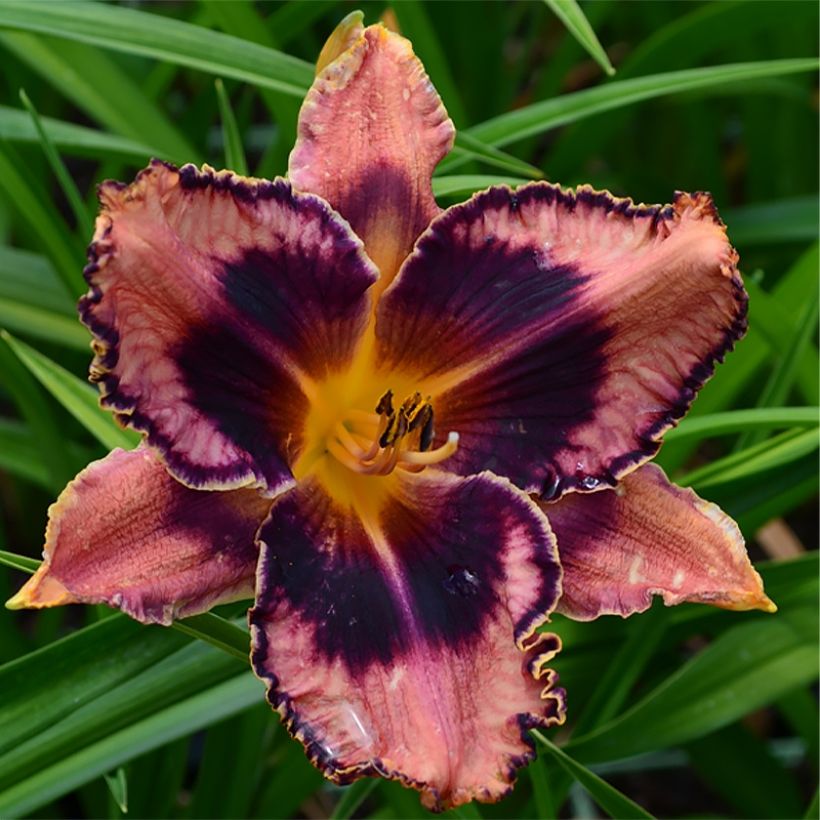

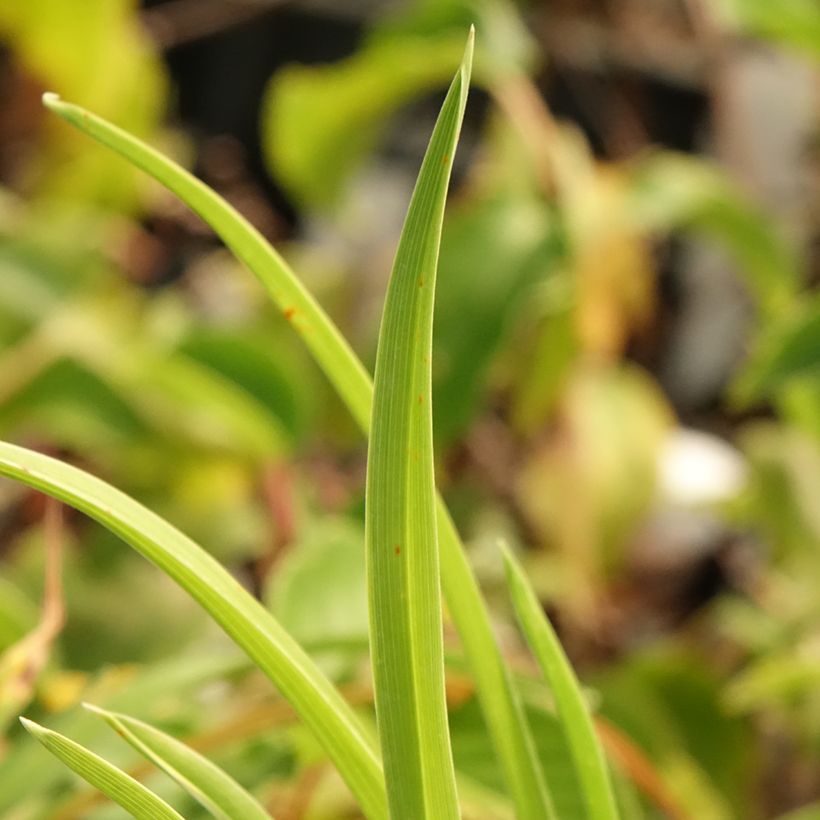

Flowering
Foliage
Plant habit
Botanical data
Hemerocallis
Exotic Treasure
Hemerocallidaceae (Liliaceae)
Daylily
Cultivar or hybrid
Other Hemerocallis - Daylilies
View all →Planting and care
Plant your Hemerocallis 'Exotic Treasure' in well-draining garden soil that is not too clayey and enriched with humus and compost. This will allow your perennial to withstand summer droughts and winter frosts. This variety is easy to grow and not susceptible to pests or diseases, so no treatment is required, and rodents are not attracted to it. Daylilies can grow both in partial shade and full sun, with 4 to 5 hours of daily sunlight sufficient—plant by burying the base 3 to 4 cm (1 to 2in) below the surface. If planting multiple plants, ensure enough space between them, as the spaces will quickly fill up. For a few weeks after planting, ensure the soil is moderately moist, but do not overwater. It is advisable to divide the plants, preferably in autumn after flowering.
Planting period
Intended location
Care
-
, onOrder confirmed
Reply from on Promesse de fleurs
Similar products
Haven't found what you were looking for?
Hardiness is the lowest winter temperature a plant can endure without suffering serious damage or even dying. However, hardiness is affected by location (a sheltered area, such as a patio), protection (winter cover) and soil type (hardiness is improved by well-drained soil).

Photo Sharing Terms & Conditions
In order to encourage gardeners to interact and share their experiences, Promesse de fleurs offers various media enabling content to be uploaded onto its Site - in particular via the ‘Photo sharing’ module.
The User agrees to refrain from:
- Posting any content that is illegal, prejudicial, insulting, racist, inciteful to hatred, revisionist, contrary to public decency, that infringes on privacy or on the privacy rights of third parties, in particular the publicity rights of persons and goods, intellectual property rights, or the right to privacy.
- Submitting content on behalf of a third party;
- Impersonate the identity of a third party and/or publish any personal information about a third party;
In general, the User undertakes to refrain from any unethical behaviour.
All Content (in particular text, comments, files, images, photos, videos, creative works, etc.), which may be subject to property or intellectual property rights, image or other private rights, shall remain the property of the User, subject to the limited rights granted by the terms of the licence granted by Promesse de fleurs as stated below. Users are at liberty to publish or not to publish such Content on the Site, notably via the ‘Photo Sharing’ facility, and accept that this Content shall be made public and freely accessible, notably on the Internet.
Users further acknowledge, undertake to have ,and guarantee that they hold all necessary rights and permissions to publish such material on the Site, in particular with regard to the legislation in force pertaining to any privacy, property, intellectual property, image, or contractual rights, or rights of any other nature. By publishing such Content on the Site, Users acknowledge accepting full liability as publishers of the Content within the meaning of the law, and grant Promesse de fleurs, free of charge, an inclusive, worldwide licence for the said Content for the entire duration of its publication, including all reproduction, representation, up/downloading, displaying, performing, transmission, and storage rights.
Users also grant permission for their name to be linked to the Content and accept that this link may not always be made available.
By engaging in posting material, Users consent to their Content becoming automatically accessible on the Internet, in particular on other sites and/or blogs and/or web pages of the Promesse de fleurs site, including in particular social pages and the Promesse de fleurs catalogue.
Users may secure the removal of entrusted content free of charge by issuing a simple request via our contact form.
The flowering period indicated on our website applies to countries and regions located in USDA zone 8 (France, the United Kingdom, Ireland, the Netherlands, etc.)
It will vary according to where you live:
- In zones 9 to 10 (Italy, Spain, Greece, etc.), flowering will occur about 2 to 4 weeks earlier.
- In zones 6 to 7 (Germany, Poland, Slovenia, and lower mountainous regions), flowering will be delayed by 2 to 3 weeks.
- In zone 5 (Central Europe, Scandinavia), blooming will be delayed by 3 to 5 weeks.
In temperate climates, pruning of spring-flowering shrubs (forsythia, spireas, etc.) should be done just after flowering.
Pruning of summer-flowering shrubs (Indian Lilac, Perovskia, etc.) can be done in winter or spring.
In cold regions as well as with frost-sensitive plants, avoid pruning too early when severe frosts may still occur.
The planting period indicated on our website applies to countries and regions located in USDA zone 8 (France, United Kingdom, Ireland, Netherlands).
It will vary according to where you live:
- In Mediterranean zones (Marseille, Madrid, Milan, etc.), autumn and winter are the best planting periods.
- In continental zones (Strasbourg, Munich, Vienna, etc.), delay planting by 2 to 3 weeks in spring and bring it forward by 2 to 4 weeks in autumn.
- In mountainous regions (the Alps, Pyrenees, Carpathians, etc.), it is best to plant in late spring (May-June) or late summer (August-September).
The harvesting period indicated on our website applies to countries and regions in USDA zone 8 (France, England, Ireland, the Netherlands).
In colder areas (Scandinavia, Poland, Austria...) fruit and vegetable harvests are likely to be delayed by 3-4 weeks.
In warmer areas (Italy, Spain, Greece, etc.), harvesting will probably take place earlier, depending on weather conditions.
The sowing periods indicated on our website apply to countries and regions within USDA Zone 8 (France, UK, Ireland, Netherlands).
In colder areas (Scandinavia, Poland, Austria...), delay any outdoor sowing by 3-4 weeks, or sow under glass.
In warmer climes (Italy, Spain, Greece, etc.), bring outdoor sowing forward by a few weeks.






























